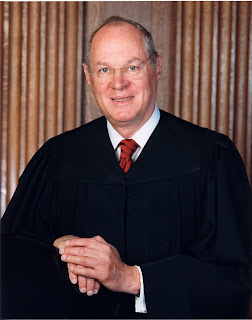As we noted earlier ("Redeeming the Culture") the U.S. Supreme Court recently handed down its decisions on a pair of same-sex marriage cases. In one of them, United States v. Windsor, the Court struck down provisions in the federal Defense of Marriage Act (DOMA) that defined marriage, for purposes of federal benefits, as a union between one man and one woman. Under the Court's ruling the federal government will now be obliged to recognized same-sex marriages that were solemnized in states where such unions are legal.
When one reads the fine print of the Court's opinion a chilling specter arises. Justice Kennedy, writing for
 |
| Justice Anthony M. Kennedy |
What Justice Kennedy has done, in effect, is to equate "traditional (especially Judeo-Christian) morality" with a purpose to "degrade," "demean," and "disparage" one class of citizens, and to treat their marriages as "less worthy" than others. Morality, in other words, is tantamount to bigotry.
Justices Scalia and Alito both delivered scathing dissents. Justice Scalia, in particular, noted a disturbing implication of the Court's decision. Even though Justice Kennedy had concluded his opinion by saying "This opinion and its holding are confined to those lawful marriages," i.e., those that have been declared legal by the states in which they were made, Justice Scalia observed "How easy it is, indeed how inevitable, to reach the same conclusion with regard to state laws denying same-sex couples marital status" (dissenting opinion, p. 23). In other words, it is only a matter of time before gay couples will sue the states where same-sex marriage is still illegal, and the federal courts will find those laws unconstitutional using the same legal reasoning as Justice Kennedy did in his opinion.
Justice Alito, in his dissenting opinion, noted that "The long-term consequences of this change are not now known and are unlikely to be ascertainable for some time to come" (dissenting opinion, p.8). In a footnote he added, "As sociologists have documented, it sometimes takes decades to document the effects of social changes – like the sharp rise in divorce rates following the advent of no-fault divorce – on children and society" (Ibid.). And he concludes by saying, "At present, no one – including social scientists, philosophers, and historians – can predict with any certainty what the long-term ramifications of widespread acceptance of same-sex marriage will be" (p. 9).
And yet accepted is what same-sex marriage is rapidly becoming. For better or for worse, the U.S. Supreme Court has taken the fateful plunge, and it is probably too late to turn around now. Supreme Court decisions are notoriously difficult to reverse.
It is perhaps only a matter of time before those churches who wish to remain faithful to Christian standards of morality will find themselves branded as bigoted hate groups. The Court's decision does not augur well for the continued freedom of religion in this country.
Other blog posts on related topics:
The Queer Scouts of America?
The Real Issue in the Gay Marriage Debate
Same Sex Marriage:What Is at Stake
This seems like an over-reaction. Justice Kennedy was standing up for states rights.
ReplyDeleteYou seem to be concerned that the court decision will lead to social change. However, the social change has already occurred and the court has simply acknowledged it.
It is perhaps only a matter of time before those churches who wish to remain faithful to Christian standards of morality will find themselves branded as bigoted hate groups.
The court decision should not have any impact. It does not apply to churches, and it does not compel any private behavior.
The court decision should not have any impact. It does not apply to churches, and it does not compel any private behavior.
ReplyDeleteIf a church wished to not marry a couple because they are not of the same skin colour then that's for that particular church to decide. The community will react accordingly.
Behave like Fred Phelps and people will draw the parallels themselves.
Religious freedom is not affected one way or the other.
It was announced today that the ACLU is bringing a lawsuit against the Commonwealth of Pennsylvania to overturn that state's law forbidding gay marriages. And in an unrelated story NPR reported on attempts to end workplace discrimination against LGBT people, in opposition to private employers who say their religious scruples would be violated. If anything I appear to have underestimated how swiftly the changes have taken place.
ReplyDeleteIt was announced today that the ACLU is bringing a lawsuit against the Commonwealth of Pennsylvania to overturn that state's law forbidding gay marriages. And in an unrelated story NPR reported on attempts to end workplace discrimination against LGBT people, in opposition to private employers who say their religious scruples would be violated. If anything I appear to have underestimated how swiftly the changes have taken place.
ReplyDeleteYes but churches don't have to marry people if they don't like them. Religious freedom is unaffected.
ReplyDeleteStates are not churches. Government is of the people.
An employer can't discriminate either.
Nothing to do with religious freedom.
Behold....
"It was announced today that the ACLU is bringing a lawsuit against the Commonwealth of Pennsylvania to overturn that state's law forbidding interracial marriages. And in an unrelated story NPR reported on attempts to end workplace discrimination against non-white people, in opposition to private white employers who say their religious scruples against uppity N*#@$&! would be violated."
See?
America survived allowing black people to eat safely in restaurants. It will happily survive allowing gay people to get married. The sky will not fall.